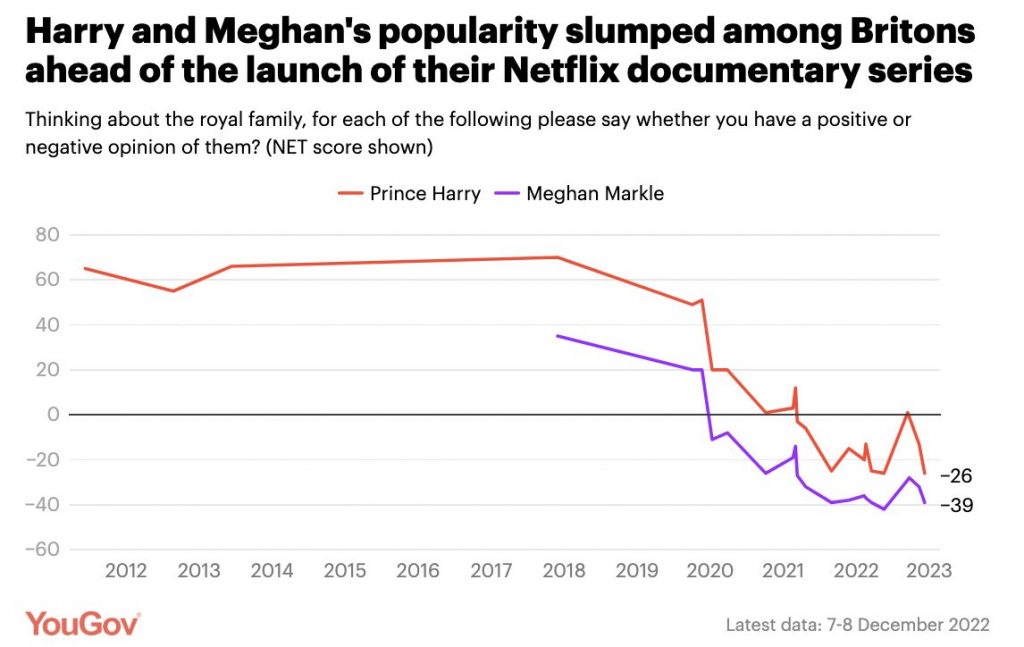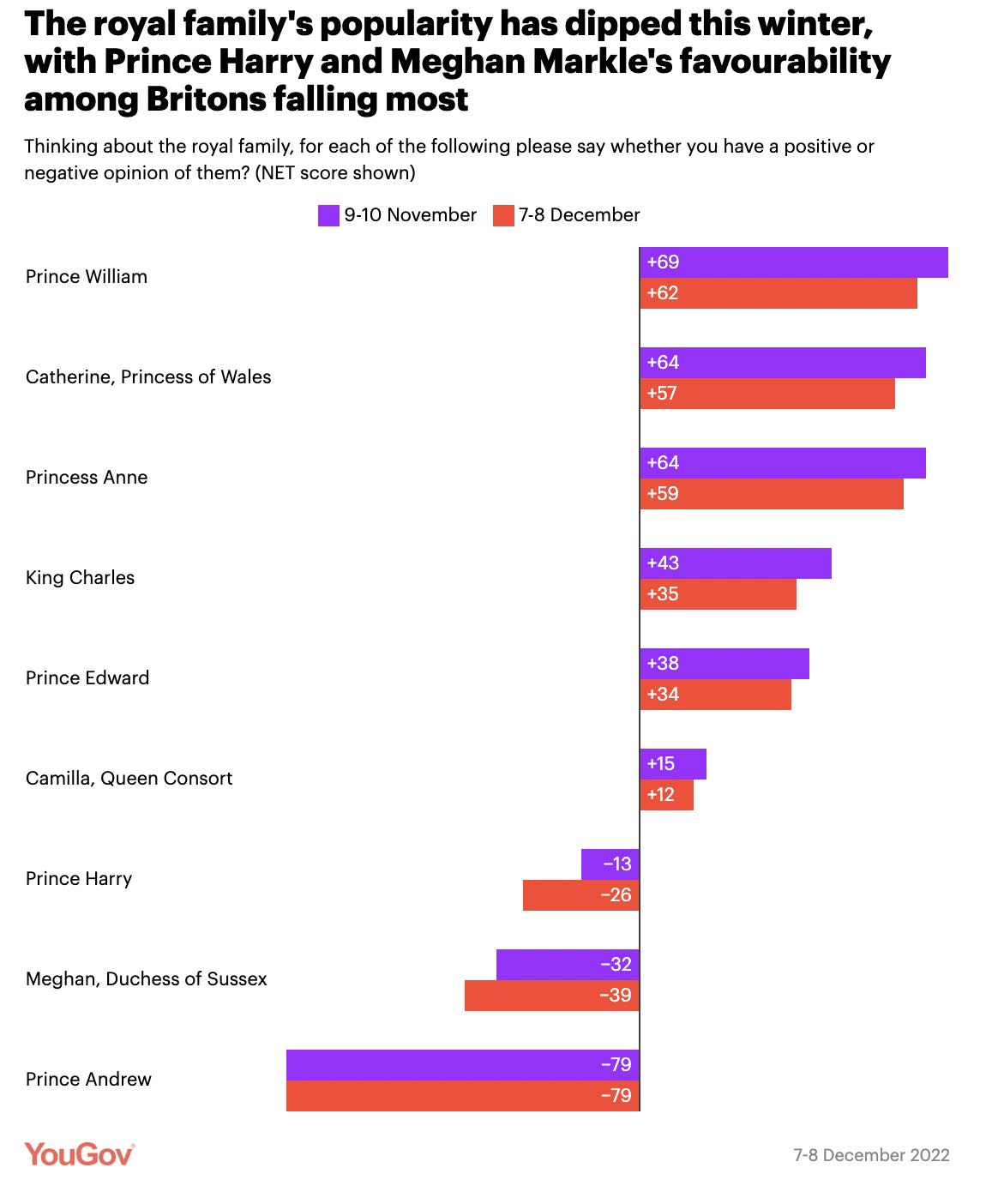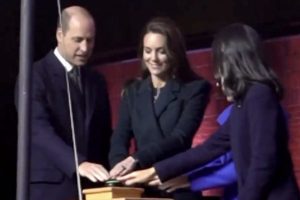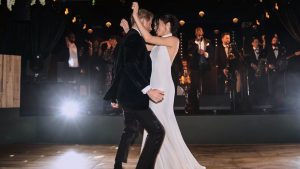London – Prince Harry and his wife Meghan Markle’s war against the British royal family isn’t gaining popularity as the couple had hoped, according to British research institute YouGov.
Regularly measuring the popularity of celebrities, the company polled 4,000 Britons on December 13 after the first three episodes of the explosive Netflix documentary were shown, and found the couple lost more than they earned.
According to YouGov data, 4% of respondents started seeing them more positively, while 14% said they had a more negative impression of the couple at that time.
How have British views of Prince Harry and Meghan changed since the Netflix series aired?
Now has a more positive view: 4%
Now has a more negative view: 14%
No change, I still think positively: 11%
No change, still negative opinion: %34https://t.co/xGbb1Bahuq pic.twitter.com/wEOVxM0AA7—YouGov (@YouGov) 13 December 2022
Although the result does not yet reflect the second block of the series, it points to a tendency to disapprove of the claims.
Harry has the lowest popularity rating since 2012, dropping 13 percent after a brief backlash at the time of Queen Elizabeth’s death.
Meghan was a little worse, but far from a fanfare of almost 40% in 2018, her wedding year.

But recent events have tarnished the institution of the monarchy, leaving sequels for the whole family.
Things were not going well before the first episodes aired, but with the impact of revelations plaguing the royal family and the racism incident at Buckingham Palace that interrupted Prince William and Kate’s visit to the United States.
Also read | William and Kate’s US tour marred by racism scandal at Buckingham Palace
According to the YouGov institute’s new quarterly monitoring tour (interviews on December 7 and 8), which measures the popularity of all royals, everyone has lost.
King Charles III ranks fourth among the most admired living members of the family.
Harry and Meghan’s Popularity Depends on Political Link
Survey opinions received after the first episodes of Harry & Meghan aired differed according to the respondent’s political orientation; this reflects the greater tendency of conservatives to support the monarchy tradition and push back those who challenge the status quo.
The rate of Conservative Party voters who started to think more negatively about themselves is 22%, while the rate of those who voted for the Labor Party is 11%.
In the second and final bundle of episodes, which premiered on Netflix on Thursday (15), Harry and Meghan were even tougher in their complaints about press harassment, racism and royal family attitudes.
Prince William was accused by his younger brother of yelling at him at a meeting to discuss the couple’s future after his decision to move to the US.
And Buckingham Palace has been accused of planting negative news about Meghan to silence disturbing stories about other royalty from the news.
The press continued to be demonized as the Duchess of Sussex’s mother revealed that she had suicidal thoughts from her daughter due to pressure.
Also read | Netflix series: Harry and Meghan raise the tone for their attacks on family and media; mother confirms suicidal thoughts
Three parts, Queen II. He did not bring any new facts in addition to details about the disagreements, as Elizabeth neglected to defend Harry in order to protect the institution.
Such comments tend to annoy the British and shock the country, especially since it has only been three months since his death.
Harry and Meghan might not worry about that. Closed contracts with Netflix and Spotify are estimated to have totaled over $100 million after they ceased to be part of the “working members” core of the British royal family.
They gained prestige in the United States and formed a network of celebrity friends who publicly supported movements deemed bold to break down alleged prejudices against American Meghan, the daughter of a black mother.
Harry and Meghan were rewarded by the Robert Kennedy Foundation for tackling discrimination the week they visited the United States under an atmosphere of negative publicity over the racism trial of Prince William and Britain’s future King and Queen, Kate, at Buckingham Palace. in the royal family.
“Every time a person defends an ideal or takes action to improve the fate of others or take action against injustice, it sends out a tiny wave of hope.” To join @RFKHuman Rights as we congratulate our incredible 2022 #Wave of Hope award winners! pic.twitter.com/VnzbqgkYxA
– Kerry Kennedy (@KerryKennedyRFK) December 7, 2022
Before the show, everyone, including the monarchy, had lost their admiration.
In the eyes of the British, awards or celebrity endorsements like this don’t make much of a difference to Harry and Meghan’s popularity.
Research prior to the Netflix series has shown that they have already fallen out of favor.
In the week the documentary aired (the first episode package came out in 9), only a third (33%) of Britons thought positively of Harry, while 59% viewed him negatively.
According to YouGov’s latest real like rating, this gave him a net score of -26; this is the result of subtracting the proportion of Britons who have a negative view of it from the fraction that has a positive view.
The current position is the same as Prince Harry was in May, when YouGov recorded its lowest rating, before opinions softened and his popularity skyrocketed in September at the time of Queen Elizabeth’s death.
Meghan Markle is now welcomed by only a quarter of Britons (25%), and the only member of the royal family who is less popular with the public is Prince Andrew (7%).
About two-thirds (64%) of people said they now think badly of the duchess, giving her a net score of -39, down 7 points from November.
More than eight in ten (84%) people aged 65 and over say they have a negative opinion of the Duchess of Sussex, and 70% of them think “very negatively”.
Adults prefer William to his brother Prince Harry
The only age group most likely to have slightly more positive than negative opinions of Meghan Markle is the 18-24 age group: 40% view her positively, while 38% think negatively.
Admiration for Prince Harry remained highest among the younger generation, while he fell out of favor with older people.
YouGov shows that half (49%) of 18-24 year olds and 73% of 25-49 year olds have a positive opinion (29%) of the prince, and 18% have a negative opinion.
Older people are more likely to prefer their brothers and wife to Harry and Meghan.
But the popularity of Prince William and his wife Kate has also waned: The Prince of Wales currently has a net score of +69 (down 7 points from November), while the Princess of Wales has a net score of +64 (-7). .
This makes them the most popular figures of British royalty, especially among people aged 65 and over who have an extremely positive view of themselves.
About nine out of ten (89%) people in this age group respect Kate, while the same proportion view her husband positively.
The Prince and Princess of Wales are the most disliked 18-24 year-olds, with 31% seeing Prince William and the same proportion thinking badly of his wife.
However, among all age groups, they are viewed more positively than negatively.
Alongside William and Catherine, the most popular member of the family at this time is King George III. Princess Anne (72% positive), surpassing Charles and Queen Consort Camilla.
Charles dropped from 43% admiration to 35% in two months.

Prince Andrew is the most disliked person, with only 7% of Brits having a positive opinion of him and 86% disapproving of him. Net score -79.
He’s the only one whose rating remained stable in public from one round of the poll to the next.
Silent and hidden after losing office and honorary titles, he does not recover in front of his subjects, but he does not lose more than he loses.
Also read | Netflix series: Harry and Meghan raise the tone for their attacks on family and media; mother confirms suicidal thoughts
source: Noticias
Mark Jones is a world traveler and journalist for News Rebeat. With a curious mind and a love of adventure, Mark brings a unique perspective to the latest global events and provides in-depth and thought-provoking coverage of the world at large.

